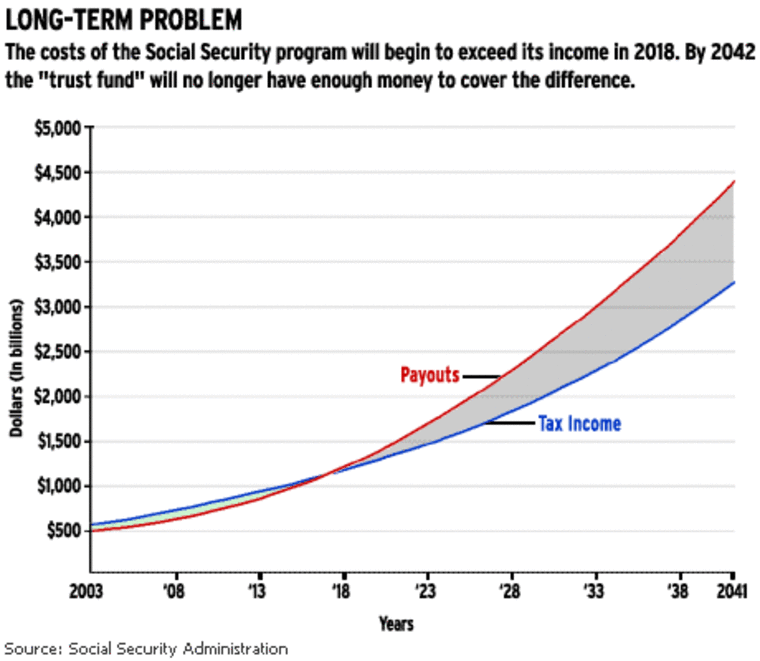There are many reasons why the federal budget has deteriorated from surplus to record deficits over the past three years, but Social Security is not one of them. Social Security and related programs currently generate annual surpluses of about $160 billion, making the short-term deficit look smaller than it otherwise would.
Yet Federal Reserve Chairman Alan Greenspan chose to focus on the massive government benefits program this week in testimony to Congress about the budget outlook, stirring up an election-year tempest.
Some wondered about Greenspan's timing, as Democrats immediately seized on his remarks and linked them to what they call President Bush’s fiscal irresponsibility in pushing huge tax cuts through Congress while presiding over sharp spending increases. But Greenspan also repeated his support for one of President Bush's top economic priorities -- making the tax cuts permanent.
There are few issues as politically sensitive as the $40 billion in old-age, survivors and disability benefits paid out each month to 47 million Americans, most of whom are highly likely to vote. So it is hardly surprising that President Bush and his Democratic critics immediately staked out positions when Greenspan suggested cutting future benefits and raising the retirement age.
Virtually everyone who has studied the issue agrees that something has to be done to repair Social Security’s long-term financial position. But that's where the consensus ends. And most analysts expect little more than political rhetoric this year as the issue gets tangled in the debate over Bush administration tax cuts and economic growth.
Bush said he would protect benefits for people “at or near retirement” and reiterated his proposal for personal savings accounts for younger workers that would become a partial substitute for Social Security. But even proponents of that plan acknowledge it would worsen the budget deficit in the short term by diverting payroll taxes that now go to Social Security and its trust fund.
Democratic presidential front-runner John Kerry said cutting benefits was "the wrong way" to reduce deficits, and other Democrats quickly piled on.
In a letter asking President Bush to “publicly reject” Greenspan’s suggestions, Democratic senators pointed out that the projected Social Security shortfall over the next 75 years is less than one-third the projected cost of tax cuts enacted over the past three years. “It is simply wrong to claim that we can afford permanent tax breaks for the most fortunate among us, but we can’t afford to honor our commitment to America’s seniors,” said the letter signed by Sens. Jon Corzine, Kent Conrad, Minority Leader Tom Daschle and others.
Government estimates using relatively conservative economic and demographic assumptions show that Social Security is likely to become insolvent in 2042, or perhaps as early as 2030 if growth is slower than expected and inflation is high. If growth is stronger than expected and inflation lower, it is possible Social Security could survive indefinitely in its current form, although that is not considered the most likely outcome.

So at some point it is likely taxes will have to be raised, benefits cut or both — ideas that are anathema in an election year and unlikely to be touched by the current Congress. Greenspan, of course, does not face re-election, although he is hardly unaffected by political realities.
Peter Orszag, a Brookings Institution economist who served in the Clinton administration and has written extensively about Social Security, said Greenspan had “put himself into a box unnecessarily” with his testimony Wednesday. The Fed chief reiterated his support for a permanent extension of Bush’s tax cuts while acknowledging that Congress is highly unlikely to be able to solve the nation’s long-term fiscal problems entirely through spending cuts.
“One way of actually interpreting what he is doing is to admit there will have to be revenue increases,” Orszag said.
Many analysts pointed out that the Social Security gap, while troubling, is dwarfed by the problem brewing in the massive Medicare and Medicaid program, which was projected to become insolvent in 2026 even before Congress passed costly new prescription drug benefits.
And Orszag contends that the 2001 Bush tax cut by itself represents an even bigger threat to the federal budget deficit, which is expected to rise this year to a record $521 billion.
“It’s true that Social Security’s deficit needs to be addressed, but it’s not the major problem facing the federal budget,” he said.
Paul Kasriel, director of economic research at Northern Trust, was among several analysts who pointed out the contrast between Greenspan’s testimony this week and his comments before a Senate panel in 2001, just days after Bush took office.
In that memorable appearance, Greenspan came out in favor of Bush’s proposed $1.35 trillion tax-cut package, justifying his position by pointing to the potential danger posed by federal budget surpluses. At the time Greenspan expressed concern that surpluses could wipe out that federal debt, eliminating the government’s need to borrow and disrupt financial markets.
That is no longer a concern, of course, as the debt has risen past $7 trillion and the government projects budget deficits at least through 2014.
Kasriel wonders why Greenspan did not express concern about Social Security three years ago, when demographic projections were virtually the same as they are now.
“He knew that there was a demographic time bomb out there,” Kasriel said. Greenspan could have urged that the surpluses be used to shore up Social Security or even pay for a transition to partial privatization instead of backing the full Bush tax cuts.
“A few months before January 2001 Greenspan was arguing against tax cuts,” Kasriel said. “Suddenly with a new president in office who had campaigned heavily on tax cuts, Greenspan comes up with this novel argument for cutting taxes.”
While Greenspan is arguing to both make the tax cuts permanent and fix Social Security, Orszag said it is unlikely that President Bush will have the political capital to do both next year, assuming he is re-elected and Congress remains in Republican hands. Either battle promises to be fierce.